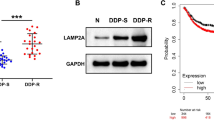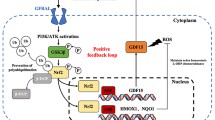Abstract
The aim of this study was to determine the effect of lncRNA HIF1A-AS2 on autophagy-associated drug resistance in small cell lung cancer (SCLC) cells. The expression of HIF1A-AS2 was silenced by siRNA in doxorubicin-sensitive H69 and doxorubicin-resistant H69AR cells. Then, cytotoxicity, apoptosis and autophagy analyses were carried out in the normoxic and CoCl2-induced hypoxic environment. The effect of HIF1A-AS2 on the expression levels of genes, which are associated with drug resistance and autophagy, was determinated by qRT-PCR analysis. The levels of MRP1, HIF-1α and Beclin-1 were analyzed by western blot method. Knockdown of HIF1A-AS2 increased doxorubicin sensitivity of SCLC cells and decreased autophagy. Knockdown of HIF1A-AS2 has also affected the expression of several genes that will increase drug sensitivity and inhibit autophagy in both cell lines. The levels of HIF-1α and Beclin-1 were decreased in both cell lines by knockdown of HIF1A-AS2. MRP1 expression was decrease in H69AR cells. In addition, CoCl2-induced hypoxic environment decreased in doxorubicin sensitivity of H69 cells, and knockdown of HIF1A-AS2 reversed this effect of hypoxia. Knockdown of HIF1A-AS2 increased drug sensitivity of SCLC cells in relation to autophagy. Therefore, hypoxia-HIF1A-AS2-autophagy interaction is thought to be determinative in drug sensitivity of these cells.





Similar content being viewed by others
Data availability
All data generated or analyzed during this study are included in this published article.
References
Chen YT, Feng B, Chen LB. Update of research on drug resistance in small cell lung cancer chemotherapy. Asian Pac J Cancer Prev. 2012;13(8):3577–81.
Koinis F, Kotsakis A, Georgoulias V. Small cell lung cancer (SCLC): no treatment advances in recent years. Transl Lung Cancer Res. 2016;5(1):39–50.
Dooley AL, Winslow MM, Chiang DY, Banerji S, Stransky N, Dayton TL, Snyder EL, Senna S, Whittaker CA, Bronson RT, Crowley D, Barretina J, Garraway L, Meyerson M, Jacks T. Nuclear factor I/B is an oncogene in small cell lung cancer. Genes Dev. 2011;25(14):1470–5.
Rudin CM, Poirier JT, Byers LA, Dive C, Dowlati A, George J, Heymach JV, Johnson JE, Lehman JM, MacPherson D, Massion PP, Minna JD, Oliver TG, Quaranta V, Sage J, Thomas RK, Vakoc CR, Gazdar AF. Molecular subtypes of small cell lung cancer: a synthesis of human and mouse model data. Nat Rev Cancer. 2019;19(5):289–97.
Cree IA, Charlton P. Molecular chess? Hallmarks of anti-cancer drug resistance. BMC Cancer. 2017;17(1):10.
Li YJ, Lei YH, Yao N, Wang CR, Hu N, Ye WC, Zhang DM, Chen ZS. Autophagy and multidrug resistance in cancer. Chin J Cancer. 2017;36(1):52.
Mathew R, Karantza-Wadsworth V, White E. Role of autophagy in cancer. Nat Rev Cancer. 2007;7(12):961–7.
Tan Q, Wang M, Yu M, Zhang J, Bristow RG, Hill RP, Tannock IF. Role of autophagy as a survival mechanism for hypoxic cells in tumors. Neoplasia. 2016;18(6):347–55.
Cheetham SW, Gruhl F, Mattick JS, Dinger ME. Long noncoding RNAs and the genetics of cancer. J Cancer. 2013;108(12):2419–25.
Liu K, Gao L, Ma X, Huang JJ, Chen J, Zeng L, Ashby CR Jr, Zou C, Chen ZS. Long non-coding RNAs regulate drug resistance in cancer. Mol Cancer. 2020;19(1):54.
Thrash-Bingham CA, Tartof KD. aHIF: a natural antisense transcript overexpressed in human renal cancer and during hypoxia. J Natl Cancer Inst. 1999;91(2):143–51.
Uchida T, Rossignol F, Matthay MA, Mounier R, Couette S, Clottes E, Clerici C. Prolonged hypoxia differentially regulates hypoxia-inducible factor (HIF)-1alpha and HIF-2alpha expression in lung epithelial cells: implication of natural antisense HIF-1alpha. J Biol Chem. 2004;279(15):14871–8.
Chen D, Wu L, Liu L, Gong Q, Zheng J, Peng C, Deng J. Comparison of HIF1A-AS1 and HIF1A-AS2 in regulating HIF-1α and the osteogenic differentiation of PDLCs under hypoxia. Int J Mol Med. 2017;40(5):1529–36.
Li L, Wang M, Mei Z, Cao W, Yang Y, Wang Y, Wen A. lncRNAs HIF1A-AS2 facilitates the up-regulation of HIF-1α by sponging to miR-153-3p, whereby promoting angiogenesis in HUVECs in hypoxia. Biomed Pharmacother. 2017;96:165–72.
Ma CP, Liu H, Yi-Feng Chang I, Wang WC, Chen YT, Wu SM, Chen HW, Kuo YP, Shih CT, Li CY, Tan BC. ADAR1 promotes robust hypoxia signaling via distinct regulation of multiple HIF-1α-inhibiting factors. EMBO Rep. 2019. https://doi.org/10.1552/embr.201847107.
Chen WM, Huang MD, Kong R, Xu TP, Zhang EB, Xia R, Sun M, De W, Shu YQ. Antisense long noncoding RNA HIF1A-AS2 is upregulated in gastric cancer and associated with poor prognosis. Dig Dis Sci. 2015;60(6):1655–62.
Chen M, Zhuang C, Liu Y, Li J, Dai F, Xia M, Zhan Y, Lin J, Chen Z, He A, Xu W, Zhao G, Guo Y, Cai Z, Huang W. Tetracycline-inducible shRNA targeting antisense long non-coding RNA HIF1A-AS2 represses the malignant phenotypes of bladder cancer. Cancer Lett. 2016;376(1):155–64.
Mineo M, Ricklefs F, Rooj AK, Lyons SM, Ivanov P, Ansari KI, Nakano I, Chiocca EA, Godlewski J, Bronisz A. The long non-coding RNA HIF1A-AS2 facilitates the maintenance of mesenchymal glioblastoma stem-like cells in hypoxic niches. Cell Rep. 2016;15(11):2500–9.
Lin J, Shi Z, Yu Z, He Z. LncRNA HIF1A-AS2 positively affects the progression and EMT formation of colorectal cancer through regulating miR-129-5p and DNMT3A. Biomed Pharmacother. 2018;98:433–9.
Guo X, Lee S, Cao P. The inhibitive effect of sh-HIF1A-AS2 on the proliferation, invasion, and pathological damage of breast cancer via targeting miR-548c-3p through regulating HIF-1α/VEGF pathway in vitro and vivo. Onco Targets Ther. 2019;12:825–34.
Lin H, Zhao Z, Hao Y, He J, He J. Long noncoding RNA HIF1A-AS2 facilitates cell survival and migration by sponging miR-33b-5p to modulate SIRT6 expression in osteosarcoma. Biochem Cell Biol. 2020;98(2):284–92.
Jiang YZ, Liu YR, Xu XE, Jin X, Hu X, Yu KD, Shao ZM. Transcriptome analysis of triple-negative breast cancer reveals an integrated mRNA-lncRNA signature with predictive and prognostic value. Cancer Res. 2016;76(8):2105–14.
Chen X, Liu M, Meng F, Sun B, Jin X, Jia C. The long noncoding RNA HIF1A-AS2 facilitates cisplatin resistance in bladder cancer. J Cell Biochem. 2019;120(1):243–52.
Kuang P, Chen P, Wang L, Li W, Chen B, Liu Y, Xu Y, Wang H, Zhao S, Ye L, Yu F, Ji H, He Y. RNA sequencing analysis of small cell lung cancer reveals candidate chemotherapy insensitivity long noncoding RNAs and microRNAs. Ann Transl Med. 2020;8(4):121.
Wohlkoenig C, Leithner K, Olschewski A, Olschewski H, Hrzenjak A. TR3 is involved in hypoxia-induced apoptosis resistance in lung cancer cells downstream of HIF-1α. Lung Cancer. 2017;111:15–22.
Zhou M, Xie Y, Xu S, Xin J, Wang J, Han T, Ting R, Zhang J. An F (2020) Hypoxia-activated nanomedicines for effective cancer therapy. Eur J Med Chem. 2020;195:112274.
Munoz M, Henderson M, Haber M, Norris M. Role of the MRP1/ABCC1 multidrug transporter protein in cancer. IUBMB Life. 2007;59(12):752–7.
Dury L, Nasr R, Lorendeau D, Comsa E, Wong I, Zhu X, Chan KF, Chan TH, Chow L, Falson P, Di Pietro A, Baubichon-Cortay H. Flavonoid dimers are highly potent killers of multidrug resistant cancer cells overexpressing MRP1. Biochem Pharmacol. 2017;124:10–8.
Pérès B, Nasr R, Zarioh M, Lecerf-Schmidt F, Di Pietro A, Baubichon-Cortay H, Boumendjel A. Ferrocene-embedded flavonoids targeting the Achilles heel of multidrug-resistant cancer cells through collateral sensitivity. Eur J Med Chem. 2017;130:346–53.
Chewchuk S, Boorman T, Edwardson D, Parissenti AM. Bile acids increase doxorubicin sensitivity in ABCC1-expressing tumour cells. Sci Rep. 2018;8(1):5413.
Kogita A, Togashi Y, Hayashi H, Sogabe S, Terashima M, De Velasco MA, Sakai K, Fujita Y, Tomida S, Takeyama Y, Okuno K, Nakagawa K, Nishio K. Hypoxia induces resistance to ALK inhibitors in the H3122 non-small cell lung cancer cell line with an ALK rearrangement via epithelial-mesenchymal transition. Int J Oncol. 2014;45(4):1430–6.
Li S, Wei Q, Li Q, Zhang B, Xiao Q. Down-regulating HIF-1α by lentivirus-mediated shRNA for therapy of triple negative breast cancer. Cancer Biol Ther. 2015;16(6):866–75.
Hillion J, Wood LJ, Mukherjee M, Bhattacharya R, Di Cello F, Kowalski J, Elbahloul O, Segal J, Poirier J, Rudin CM, Dhara S, Belton A, Joseph B, Zucker S, Resar LM. Upregulation of MMP-2 by HMGA1 promotes transformation in undifferentiated, large-cell lung cancer. Mol Cancer Res. 2009;7(11):1803–12.
Chiappetta G, Ottaiano A, Vuttariello E, Monaco M, Galdiero F, Gallipoli A, Pilotti S, Jodice G, Siranoush M, Colombo M, Ripamonti CB, Pallante PL, Radice P, Fusco A. HMGA1 protein expression in familial breast carcinoma patients. Eur J Cancer. 2010;46(2):332–9.
Williams MD, Zhang X, Belton AS, Xian L, Huso T, Park JJ, Siems WF, Gang DR, Resar LM, Reeves R, Hill HH Jr. HMGA1 drives metabolic reprogramming of intestinal epithelium during hyperproliferation, polyposis, and colorectal carcinogenesis. J Proteome Res. 2015;14(3):1420–31.
Colamaio M, Tosti N, Puca F, Mari A, Gattordo R, Kuzay Y, Federico A, Pepe A, Sarnataro D, Ragozzino E, Raia M, Hirata H, Gemei M, Mimori K, Del Vecchio L, Battista S, Fusco A. HMGA1 silencing reduces stemness and temozolomide resistance in glioblastoma stem cells. Expert Opin Ther Targets. 2016;20(10):1169–79.
Parzych KR, Klionsky DJ. An overview of autophagy: morphology, mechanism, and regulation. Antioxid Redox Signal. 2014;20(3):460–73.
Towers CG, Thorburn A. Therapeutic targeting of autophagy. EBioMedicine. 2016;14:15–23.
Li X, Zhou Y, Li Y, Yang L, Ma Y, Peng X, Yang S, Liu J, Li H. Autophagy: a novel mechanism of chemoresistance in cancers. Biomed Pharmacother. 2019;119:109415.
Hong SK, Kim JH, Starenki D, Park JI. Autophagy sensitivity of neuroendocrine lung tumor cells. Int J Oncol. 2013;43(6):2031–8.
Rupniewska E, Roy R, Mauri FA, Liu X, Kaliszczak M, Bellezza G, Cagini L, Barbareschi M, Ferrero S, Tommasi AM, Aboagye E, Seckl MJ, Pardo OE. Targeting autophagy sensitises lung cancer cells to Src family kinase inhibitors. Oncotarget. 2018;9(44):27346–62.
Kaminskyy VO, Piskunova T, Zborovskaya IB, Tchevkina EM, Zhivotovsky B. Suppression of basal autophagy reduces lung cancer cell proliferation and enhances caspase-dependent and -independent apoptosis by stimulating ROS formation. Autophagy. 2012;8:7.
Liu L, Zhao WM, Yang XH, Sun ZQ, Jin HZ, Lei C, Jin B, Wang HJ. Effect of inhibiting Beclin-1 expression on autophagy, proliferation and apoptosis in colorectal cancer. Oncol Lett. 2017;14(4):4319–24.
Chen W, Li Z, Liu H, Jiang S, Wang G, Sun L, Li J, Wang X, Yu S, Huang J, Dong Y. MicroRNA-30a targets BECLIN-1 to inactivate autophagy and sensitizes gastrointestinal stromal tumor cells to imatinib. Cell Death Dis. 2020;11(3):198.
Yang X, Bai F, Xu Y, Chen Y, Chen L. Intensified beclin-1 mediated by low expression of Mir-30a-5p promotes chemoresistance in human small cell lung cancer. Cell Physiol Biochem. 2017;43(3):1126–39.
Acknowledgements
This study was produced from the PhD thesis of Ebru Güçlü and supported by Necmettin Erbakan University, Scientific Research Projects (#181418001).
Author information
Authors and Affiliations
Contributions
EG: conceptualization, investigation, methodology, formal analysis, writing—original draft, writing—review & editing, visualization. CEG: investigation, formal analysis, visualization. EK: resources, writing—review & editing. HV: resources, writing—review & editing, supervision.
Corresponding author
Ethics declarations
Conflict of interest
The authors declare that they have no conflict of interest.
Additional information
Publisher's Note
Springer Nature remains neutral with regard to jurisdictional claims in published maps and institutional affiliations.
Rights and permissions
About this article
Cite this article
Güçlü, E., Eroğlu Güneş, C., Kurar, E. et al. Knockdown of lncRNA HIF1A-AS2 increases drug sensitivity of SCLC cells in association with autophagy. Med Oncol 38, 113 (2021). https://doi.org/10.1007/s12032-021-01562-2
Received:
Accepted:
Published:
DOI: https://doi.org/10.1007/s12032-021-01562-2




